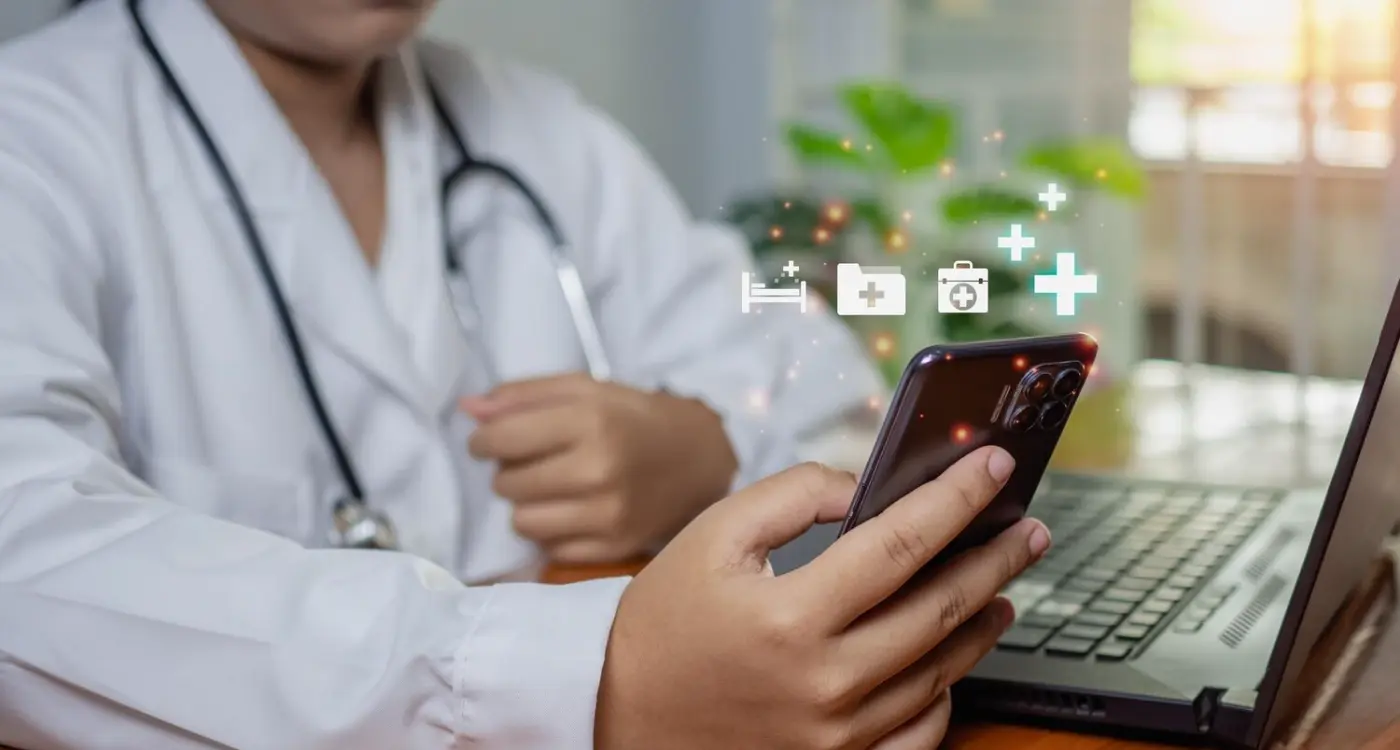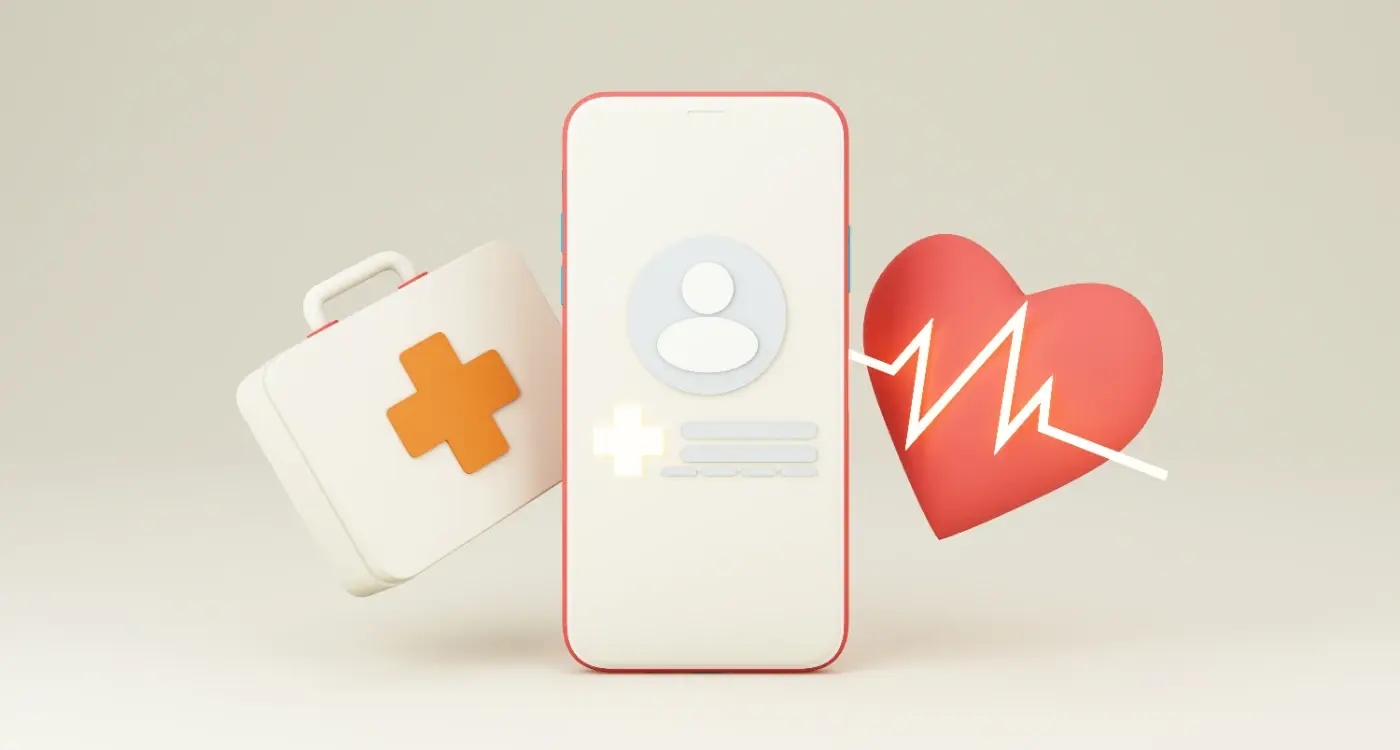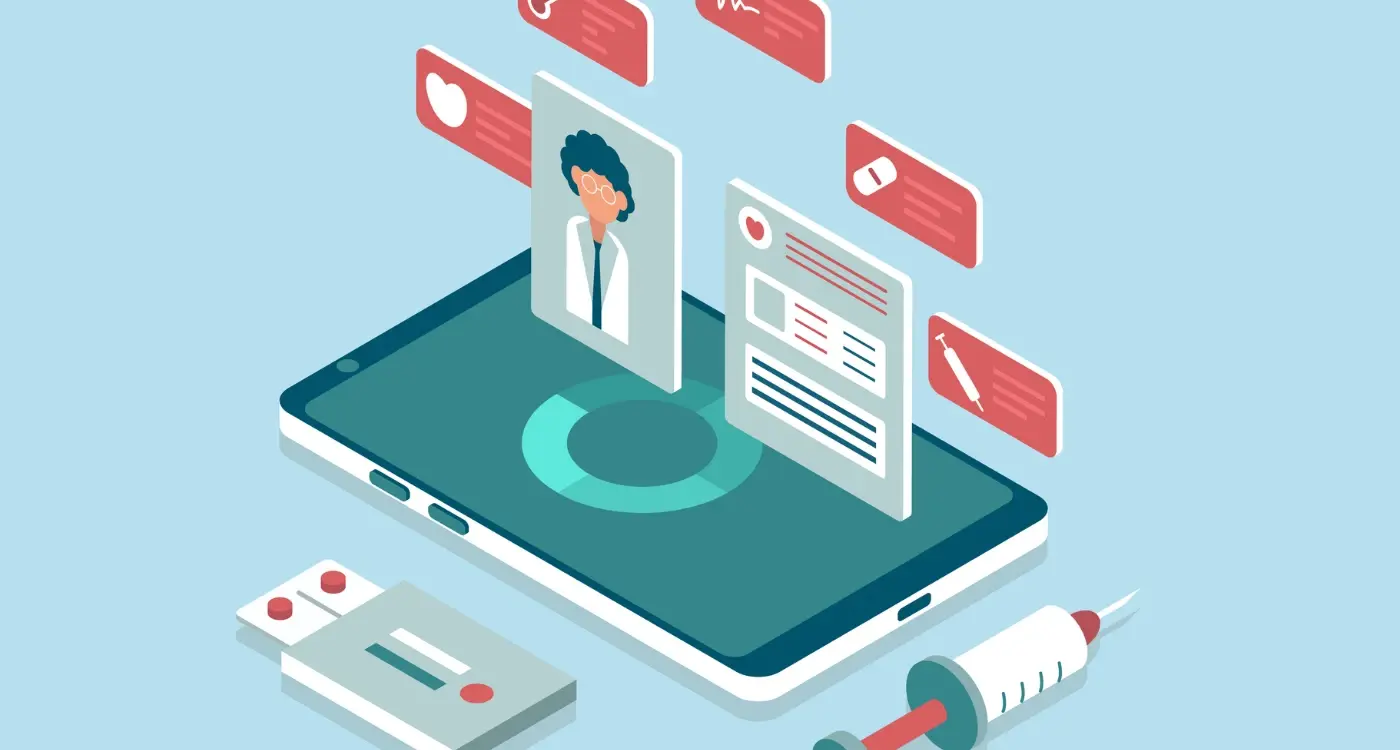How To Develop A Mobile Health App
Developing a healthcare app is quite the journey, isn't it? Whether you're a medical professional with a groundbreaking idea, an entrepreneur spotting a gap in patient care, or a healthcare organisation looking to modernise your services, you're about to embark on something rather special.
The UK's healthcare app landscape has grown tremendously since the NHS Apps Library launched in 2017. Today, we're seeing everything from mental health support apps to complex patient monitoring systems making a real difference in people's lives. Yet, we understand that starting this journey can feel overwhelming – particularly when you're juggling medical regulations, user privacy, and technical requirements.
The best healthcare apps don't just solve problems; they transform the way we think about patient care and medical accessibility
Why This Guide Matters
Having worked with numerous healthcare providers and medical startups over the past eight years, we've learned that successful health app development requires more than just good coding. It needs a deep understanding of the healthcare ecosystem, patient needs, and the strict regulatory framework that governs medical technology in the UK.
Throughout this guide, we'll walk you through every crucial step of developing a healthcare app, from initial concept to NHS approval and beyond. We'll share practical insights, common pitfalls to avoid, and essential considerations that could save you months of development time. Think of this as your friendly companion on the journey to creating a healthcare app that makes a genuine difference.
Understanding Healthcare Apps and Regulations
When you're venturing into healthcare app development, navigating the regulatory landscape can feel like trying to solve a particularly tricky puzzle. We've guided dozens of healthcare providers through this maze, and we understand it can seem overwhelming at first.
Types of Healthcare Apps
Healthcare apps broadly fall into two categories: wellness apps (like fitness trackers or meditation guides) and medical apps (such as patient management systems or diagnostic tools). Think of it like the difference between a helpful friend giving general fitness advice and a qualified doctor providing medical treatment - they're both valuable but require different levels of oversight.
Key Regulations to Consider
In the UK, if your app qualifies as a medical device, you'll need to comply with the UK Medical Device Regulations (UK MDR). It's rather like getting a MOT for your car - it's essential for safety and legally required. The Medicines and Healthcare products Regulatory Agency (MHRA) oversees this process.
You'll also need to consider data protection regulations like GDPR, especially when handling sensitive patient information. Remember the NHS data breach in 2017? It highlighted just how crucial proper data handling is in healthcare. For apps integrating with NHS systems, you'll need to meet NHS Digital's Digital Technology Assessment Criteria (DTAC).
We've seen many brilliant healthcare ideas stumble at the regulatory hurdle, so it's worth getting this right from the start. Think of regulations not as obstacles, but as guardrails helping you build something truly safe and valuable for your users. In our experience, understanding these requirements early in the development process saves considerable time and resources later.
Planning Your Health App Features
When you're embarking on a healthcare app development journey, it's rather like planning a new hospital wing - you need to get the foundations absolutely right. Having helped numerous healthcare providers bring their digital solutions to life, we understand how overwhelming this stage can feel.
Core Features to Consider
Think about your healthcare app as a digital medical assistant. Just as you wouldn't expect a GP to work without their essential tools, your app needs its core capabilities carefully mapped out. Start by identifying your primary users - whether they're patients, healthcare professionals, or both - and consider their daily challenges.
- User authentication and profile management
- Appointment scheduling and reminders
- Secure messaging system
- Electronic health records integration
- Prescription management
- Emergency contact information
- Health monitoring and tracking
Prioritising Features
Remember when the NHS first launched its COVID-19 app? They started with essential features and gradually added more. That's often the smartest approach. Begin with your Minimum Viable Product (MVP) - the smallest set of features that solves your users' primary problems.
Start by shadowing healthcare professionals or patients for a day to truly understand which features would make their lives easier. We've found this approach reveals invaluable insights that you might miss when simply brainstorming features.
Keep in mind that each feature you add must comply with NHS Digital standards and GDPR requirements. It's better to have fewer features that work brilliantly than many that create confusion or raise compliance concerns.
Design for Better Patient Experience
When it comes to healthcare apps, brilliant design isn't just about making things look pretty – it's about creating an experience that makes patients feel supported and understood. Think about it: if you're not feeling well or managing a health condition, the last thing you need is a confusing app interface adding to your stress.
Creating an Intuitive Journey
The best health apps feel almost invisible, guiding users naturally through their healthcare journey. We've found that simple, clean layouts with clear typography work wonderfully for all age groups. Remember, your users might be checking their app whilst sitting in a busy GP surgery or lying in bed feeling under the weather – they need something straightforward and reassuring.
Accessibility Matters
Healthcare apps must work for everyone, including those with visual impairments or motor difficulties. This means incorporating features like adjustable text sizes, high contrast options, and touch targets that are easy to tap. We've learned from working with the NHS that voice control options can be incredibly helpful for users with limited mobility.
Colour choices play a crucial role too. While the traditional blues and greens of healthcare feel familiar and trustworthy, we need to ensure there's enough contrast for readability. And here's something many developers overlook: emotional design elements, like friendly illustrations or encouraging messages, can make a world of difference to someone tracking their health journey.
Remember, every design decision should answer one question: "Will this make the patient's life easier?" If the answer is yes, you're on the right track.
Essential Security and Data Protection
When developing a healthcare app, security isn't just a feature - it's an absolute necessity. We understand that you're likely feeling overwhelmed by the complexity of health data protection, especially with the NHS's strict guidelines and GDPR requirements. Let's break this down into manageable pieces.
Healthcare data breaches can cost organisations an average of £3.2 million per incident, but the loss of patient trust is truly immeasurable
Core Security Requirements
Your health app must implement robust encryption for all patient data, both at rest and in transit. Think of it like a digital version of the private consultation rooms in GP surgeries - every piece of information needs its own secure space. We've found that implementing multi-factor authentication, much like the way you might use your bank's mobile app, helps create that essential extra layer of security.
Data Protection Compliance
Beyond the technical aspects, your app needs to align with GDPR and the Data Protection Act 2018. This means having clear data processing agreements, transparent privacy policies, and proper consent mechanisms. Remember how your dentist always asks for consent before sharing your records? Your app needs to do the same, but digitally.
In our experience, regular security audits and penetration testing are crucial. Just as the NHS regularly updates its security protocols, your app should adapt to new threats and vulnerabilities. We recommend implementing automated backup systems and having a clear data breach response plan - because in healthcare, being prepared isn't just good practice, it's essential for maintaining patient trust and regulatory compliance.
Choosing the Right Technology Stack
Selecting the right technology for your healthcare app can feel like trying to solve a particularly tricky puzzle. With so many options available, it's perfectly normal to feel a bit overwhelmed. Let's break this down into manageable pieces, shall we?
Native vs Cross-Platform Development
For healthcare apps, we typically recommend native development (using Swift for iOS or Kotlin/Java for Android). Think of it like building a house - while cross-platform solutions might seem quicker and cheaper initially, native development gives you a solid foundation that's crucial for healthcare applications. It offers better performance, smoother integration with device features (like biometric sensors), and enhanced security capabilities - all essential for healthcare apps.
Backend Considerations
Your backend choice is particularly crucial in healthcare. We've found that HIPAA-compliant cloud services like AWS or Microsoft Azure work brilliantly for UK healthcare apps. They're rather like having a highly-secure digital filing cabinet with built-in safety features. For the database, options like PostgreSQL or MongoDB are popular choices, though PostgreSQL tends to be our go-to for healthcare apps due to its robust security features and reliability.
Remember, your technology stack isn't just about the code - it's about building a foundation that can support complex medical functions while maintaining the highest security standards. Just as the NHS wouldn't use basic locks to secure patient records, your app needs enterprise-grade technology to protect sensitive health data. Take your time with this decision, as changing your tech stack later is a bit like trying to change the foundations of a house after it's built - possible, but rather challenging!
Building Core Medical Functions
When developing a health app, getting the core medical functions right is a bit like being a surgeon – precision and reliability are absolutely essential. We understand that this might feel like one of the most daunting parts of your app development journey, but don't worry – we'll break it down into manageable pieces.
Essential Medical Features
Your health app's core functions need to be as reliable as a trusty NHS thermometer. Start with the basics: patient data management, appointment scheduling, and secure messaging systems. If you're including features like symptom checking or medication reminders, these need to be built with rigorous medical accuracy and fail-safes.
Integration Capabilities
Remember those old filing cabinets in GP surgeries? Modern healthcare is thankfully much more sophisticated. Your app will likely need to integrate with existing healthcare systems, electronic health records (EHR), and possibly NHS Digital services. We've found that building standardised API connections from the start saves countless headaches later.
Don't forget about offline functionality – not everyone has perfect internet connection, especially in hospital buildings with their notoriously thick walls. Your app should be able to store and sync data safely when connectivity returns.
Always build in emergency protocols for critical medical functions. For example, if your app handles medication reminders, include a backup notification system and clear warnings about what to do if the app experiences technical issues.
The key is to maintain a perfect balance between functionality and simplicity. Just like a well-designed stethoscope, your app's medical functions should be sophisticated in capability but straightforward in use. After all, healthcare professionals and patients need tools they can rely on without requiring an instruction manual the size of Gray's Anatomy!
Testing Your Health App
When it comes to healthcare apps, testing isn't just a box-ticking exercise - it's about ensuring people's wellbeing and safety. We've seen countless times how proper testing can make the difference between an app that transforms lives and one that creates frustration and risk.
Essential Testing Areas
Think of testing your health app like giving it a thorough medical check-up. You'll need to examine everything from basic functionality (is that heart rate monitor actually counting properly?) to complex security measures (is patient data truly protected?). Just as doctors run multiple tests before making a diagnosis, your app needs various testing phases.
The Testing Journey
Start with unit testing, checking each component individually - rather like testing individual organs before looking at the whole body. Then move to integration testing, where you'll see how everything works together. User acceptance testing (UAT) is particularly crucial for health apps; we often involve both healthcare professionals and potential patients to ensure the app works in real-world scenarios.
Don't forget about edge cases - those unexpected situations that could occur when someone's health is at stake. What happens if someone inputs an extremely high blood pressure reading? Will your app respond appropriately during an emergency? These scenarios need thorough testing.
Remember to test across different devices and operating systems. We've learned that an app that works perfectly on an iPhone 14 might struggle on an older Android device - and in healthcare, such inconsistencies simply aren't acceptable.
Through our experience, we've found that successful testing often takes longer than expected, but it's worth every minute. After all, when it comes to people's health, there's no such thing as being too thorough.
Getting NHS and Medical Approvals
Navigating the world of healthcare app approvals can feel like trying to solve a particularly tricky puzzle. We've helped numerous developers through this process, and we understand it can seem daunting at first. Let's break it down into manageable steps.
Understanding NHS Digital Requirements
Before your health app can be recommended by NHS professionals, it needs to meet the NHS Digital Assessment Criteria. Think of it as a thorough health check-up for your app. The process evaluates everything from clinical safety to data protection, much like how a GP would examine different aspects of your health during an annual check-up.
The NHS Digital Assessment Framework isn't just a box-ticking exercise - it's about proving your app can make a real difference to people's health while keeping their data safe
Medical Device Registration
If your app qualifies as a medical device (which many health apps do), you'll need to register with the MHRA (Medicines and Healthcare products Regulatory Agency). Post-Brexit, the UK now uses the UKCA mark instead of the CE mark, though there's currently a transition period where both are accepted.
The classification of your app depends on its risk level - from Class I (lowest risk) to Class III (highest risk). For example, a simple medication reminder app would be Class I, while an app that diagnoses medical conditions would likely be Class II or higher. We've found that many developers underestimate this step, but getting it right early saves countless headaches later.
Remember, these approvals aren't just bureaucratic hoops to jump through - they're essential safeguards that help ensure your app will genuinely benefit its users while keeping their sensitive information secure.
Marketing Your Health App
After all the hard work of developing your healthcare app, it's time to get it into the hands of the people who need it most. Marketing a health app requires a different approach from promoting a casual gaming app or social platform – trust and credibility are paramount.
Building Trust Through Medical Validation
Start by highlighting any NHS approvals, clinical validations, or partnerships with healthcare institutions. Think of it like getting a doctor's recommendation – people naturally trust medical professionals. We've seen many health apps struggle simply because they didn't effectively communicate their medical credibility.
Finding Your Target Audience
Whether your app helps diabetic patients track their glucose levels or assists physiotherapists in managing patient exercises, knowing exactly who you're trying to reach is crucial. Consider where your users spend their time – are they in NHS waiting rooms, specific medical support groups, or searching for health information online?
Remember to focus on the genuine benefits your app brings to people's lives. Rather than just listing features, share real stories of how your app helps users manage their health better. For instance, if you've developed a mental health app, you might highlight how it helps users during anxious moments or supports their daily mindfulness practice.
Don't forget about healthcare professionals – they can be powerful advocates for your app. Many of our most successful health apps gained traction because GPs or specialists recommended them to patients. Consider creating educational material for healthcare providers, explaining how your app can complement their existing treatment plans.
Conclusion
Creating a healthcare app is quite the journey, isn't it? From those initial sparks of inspiration to navigating the complex waters of medical regulations, you've learned that building a health app requires careful planning, dedication, and attention to detail. But don't let the challenges discourage you - remember that every successful health app started exactly where you are now.
Throughout this guide, we've explored everything from understanding NHS requirements to implementing robust security measures. We know firsthand that building healthcare apps can feel overwhelming at times, but seeing your creation help improve people's lives makes it all worthwhile. Just imagine the satisfaction of knowing your app could help someone manage their diabetes better or remember to take their vital medications on time.
As you move forward with your health app development journey, keep in mind that success often comes from iteration and improvement. Your first version doesn't need to be perfect - many of the most popular health apps today started with basic features and evolved based on user feedback. The key is to maintain focus on patient safety, data security, and clinical effectiveness while remaining open to adaptation and growth.
We hope this guide has given you a clear roadmap for developing your healthcare app. Remember, you're not just creating another mobile application - you're potentially changing lives and contributing to the future of healthcare. Whether you're a healthcare professional with an innovative idea or a developer passionate about medical technology, you're now equipped with the knowledge to turn your vision into reality.
Share this
Subscribe To Our Learning Centre
You May Also Like
These Related Guides

How Do I Build an App for Healthcare That Patients Trust?

Do I Need FDA or MHRA Approval For My Healthcare App?



